Le Serveur WAPT ayant été installé avec succès, nous allons maintenant installer la Console WAPT.
1. Comment installer la Console de gestion WAPT¶
La console WAPT est installé en même temps que l’agent WAPT. Il est donc nécessaire d’installer l’agent WAPT sur votre machine de management, merci de vous référer à la documentation d’installation de l’agent. Sur Windows et macOS l’installation de la console WAPT se fait en même temps que l’agent. Sous Linux il est nécessaire d’installer un paquet supplémentaire.
La gestion de WAPT se fait principalement via la Console WAPT installée sur le poste de travail de l”Administrateur.
Il est recommandé de joindre l’ordinateur de l’administrateur à l’Active Directory de l” Organisation.
Le nom d’hôte du poste de travail de l’administrateur ne doit pas comporter plus de 15 caractères, ce qui est une limite de l’attribut sAMAccountName dans Active Directory.
L’ordinateur de l’administrateur deviendra essentiel pour l’administration de WAPT et le test des paquets WAPT.
Si les enregistrements DNS sont correctement configurés, vous devriez être en mesure d’accéder à l’interface web WAPT en visitant https://srvwapt.mydomain.lan. Cette page web est maintenant protégée par un mot de passe, veuillez utiliser le compte administrateur défini lors de l’installation du serveur.
La console WAPT fonctionne sur Windows, Linux et macOS.
Certaines fonctionnalités, comme la création de l’environnement de pré-éxecution WinPE pour le déploiement d’OS WADS, ne sont pas disponible sous Linux et macOS. La console WAPT sous Linux et macOS supporte le « dark mode ».
Avertissement
La Console WAPT NE DOIT PAS être installée sur votre Serveur WAPT.
La Console WAPT doit être installée sur le poste de travail d’administration à partir duquel vous gérez votre réseau.
1.1. Installation et lancement de la console WAPT¶
La console WAPT fonctionne sous Windows, Linux et macOS. Merci de choisir votre environnement.
La console WAPT est incluse par défaut dans l’installeur WAPT Agent pour Windows.
Avertissement
Si l’Agent WAPT n’est pas compilé et installé sur votre ordinateur, vous devez exécuter le programme d’installation de l’Agent WAPT pour ouvrir et configurer la Console WAPT .
Lancer le programme d’installation exécutable en tant que Administrateur local sur le poste de travail de l”Administrateur.
Choisir la langue de l’installeur WAPT.
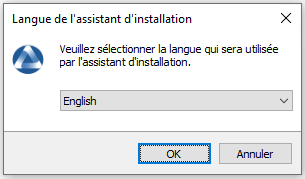
Cliquer sur OK pour passer à l’étape suivante.
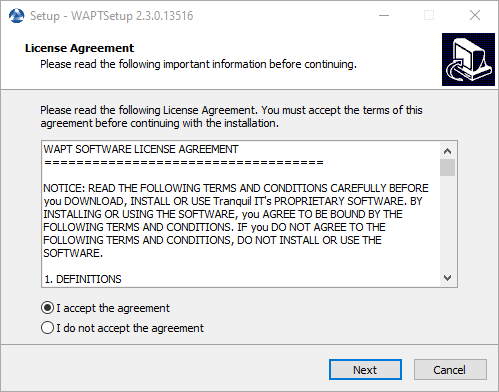
Acceptez les conditions de la licence et cliquez sur Suivant pour passer à l’étape suivante.
Choisissez une tâche supplémentaire (laissez la valeur par défaut).
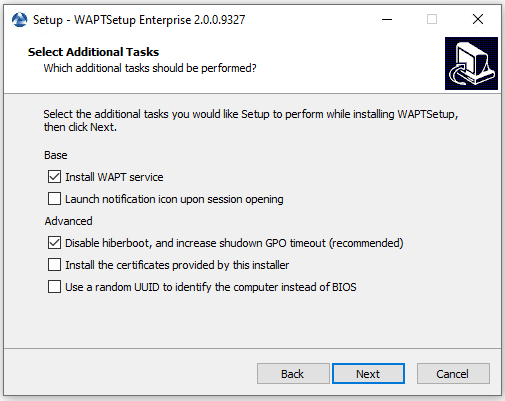
Choisir les options d’installation de l’Agent WAPT¶
Paramètres |
Description |
Valeur par défaut |
|---|---|---|
Case à cocher Installer le service WAPT |
Active le service WAPT sur cet ordinateur. |
Vérifié |
Case à cocher L’icône de notification de lancement à l’ouverture de la session |
Lancer l’Agent WAPT dans la barre d’état système au démarrage. |
Non vérifié |
Case à cocher Désactiver hiberboot, et augmenter le délai d’arrêt de la GPO (recommandé) |
Désactive le démarrage rapide de Windows pour la stabilité, élargir le délai d’attente pour l’utilitaire WAPT Exit. |
Vérifié |
Case à cocher Installer les certificats fournis par cet installeur |
Installe le certificat de Tranquil IT sur cet ordinateur. |
Non vérifié |
Utiliser un UUID aléatoire pour identifier l’ordinateur au lieu du BIOS |
Pour plus d’informations, consultez la documentation sur le bug de l’UUID BIOS |
Non vérifié |
Configurez l’URL du Serveur WAPT.
Choisissez Ne pas modifier la configuration actuelle. Nous configurerons l’Agent avec la configuration initiale dans la Console WAPT.
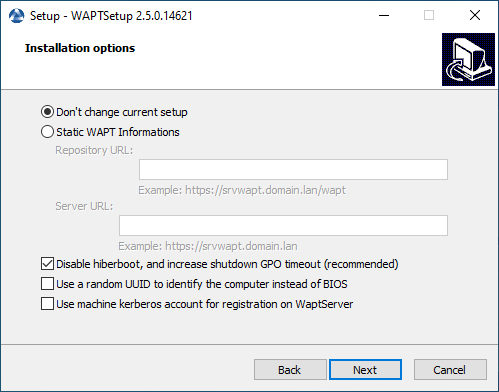
Cliquez sur Next.
Cochez Ne pas modifier la configuration actuelle, puis cliquez sur Suivant.
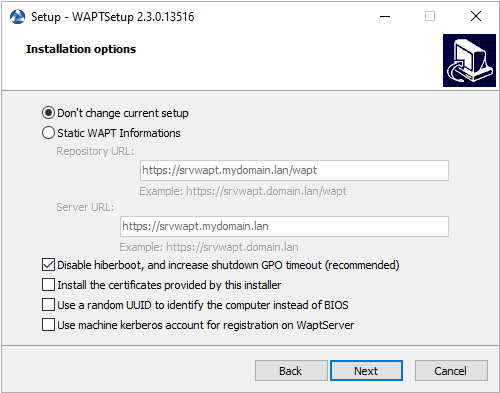
Le dépôt et le Serveur WAPT sont déjà configurés
Obtenez un résumé de l’installation de la Console WAPT.
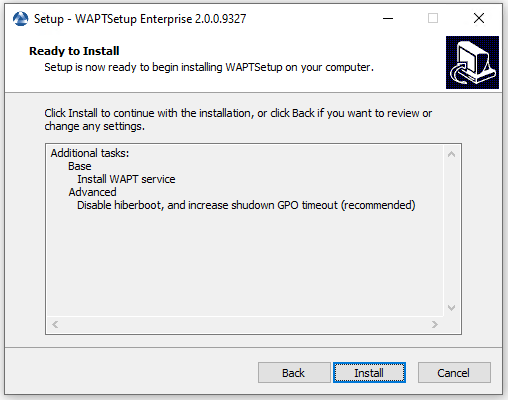
Résumé de l’installation de la Console WAPT¶
Cliquez sur Installer pour lancer l’installation, attendez que l’installation se termine, puis cliquez sur Terminé (laissez les options par défaut).
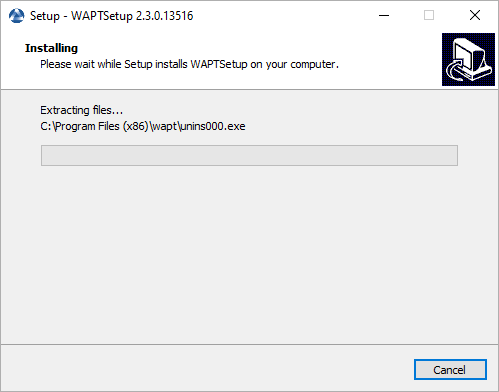
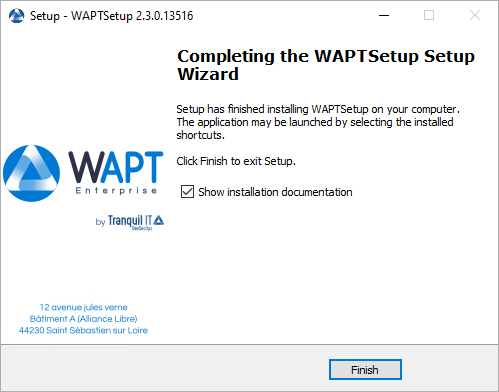
Décochez Afficher la documentation d’installation.
Lancez la Console WAPT :
En cherchant le binaire.
C:\Program Files (x86)\wapt\waptconsole.exeOu en utilisant le menu Démarrer.
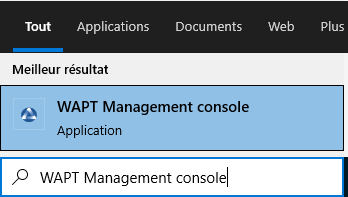
Lancement de la Console WAPT à partir du menu de démarrage de Windows.¶
La console WAPT n’est pas incluse par défaut dans l’installeur WAPT Agent.
Indication
L’Agent WAPT pour Debian a été testé sur Debian 9, 10, 11 et 12.
L’Agent WAPT pour Ubuntu n’a été testé que sur Ubuntu Bionic et Ubuntu Focal.
Mettez à jour la distribution sous-jacente et vérifiez que le transport apt https est installé
sudo apt update && apt upgrade -y
sudo apt install apt-transport-https lsb-release gnupg -y
Récupérer la clé .gpg, l’ajouter au dépôt Tranquil IT et installer l’Agent WAPT.
sudo wget -qO- https://wapt.tranquil.it/$(lsb_release -is)/tiswapt-pub.gpg | tee /usr/share/keyrings/tiswapt-pub.gpg > /dev/null
sudo echo "deb [signed-by=/usr/share/keyrings/tiswapt-pub.gpg] https://wapt.tranquil.it/$(lsb_release -is)/wapt-2.5/ $(lsb_release -cs) main" > /etc/apt/sources.list.d/wapt.list
export DEBIAN_FRONTEND=noninteractive
sudo apt update
sudo apt install tis-waptagent -y
unset DEBIAN_FRONTEND
Puis vous pouvez installer le paquet tis-waptagent-gui.
wget http://wapt.tranquil.it/wapt/releases/wapt-2.5/tis-waptagent-gui-2.5.4.15342-6215c9da-amd64.deb
sudo apt install ./tis-waptagent-gui-2.5.4.15342-6215c9da-amd64.deb
Lancez la Console WAPT :
En cherchant le binaire.
/opt/wapt/waptconsole.bin
Ou en utilisant le menu Démarrer.
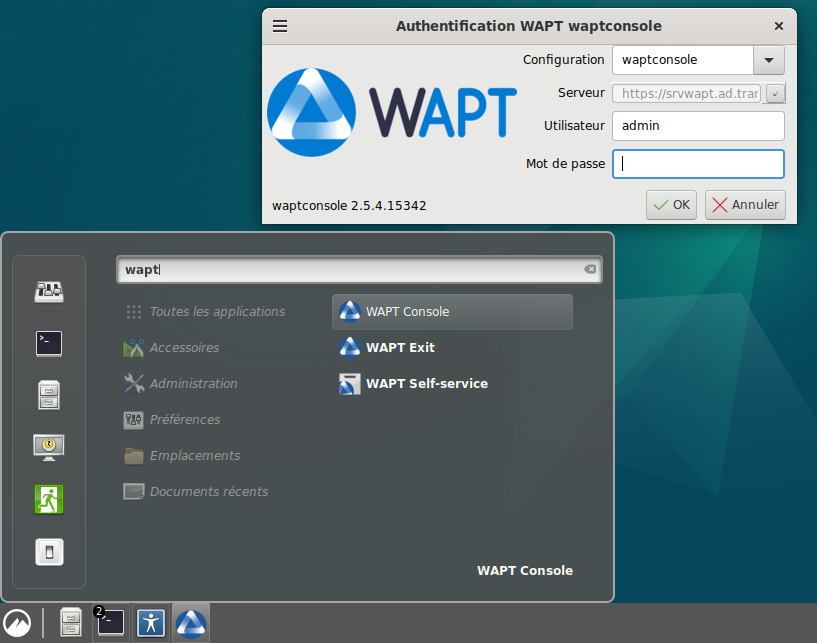
Démarrage de la console WAPT sous Linux¶
La console WAPT n’est pas incluse par défaut dans l’installeur WAPT Agent.
Indication
L’Agent WAPT pour les systèmes basés sur Redhat a été testé sur RedHat 7/8/9 et dérivés sur des architectures x86_64.
Mettre à jour la distribution sous-jacente.
yum update
Récupérez la clé
.gpget configurez le dépôt WAPT.
RH_VERSION=$(cat /etc/system-release-cpe | awk -F: '{ print $5}')
wget -q -O /tmp/tranquil_it.gpg "https://wapt.tranquil.it/redhat${RH_VERSION}/RPM-GPG-KEY-TISWAPT-${RH_VERSION}"; rpm --import /tmp/tranquil_it.gpg
cat > /etc/yum.repos.d/wapt.repo <<EOF
[wapt]
name = WAPT Server Repo
baseurl = https://wapt.tranquil.it/redhat${RH_VERSION}/wapt-2.6/
enabled = True
gpgcheck = True
EOF
installer l’Agent WAPT en utilisant yum :
yum install tis-waptagent
Puis vous pouvez installer le paquet tis-waptagent-gui.
wget http://wapt.tranquil.it/wapt/releases/wapt-2.5/tis-waptagent-gui-2.5.4.15342-6215c9da.x86_64.rpm
sudo yum install ./tis-waptagent-gui-2.5.4.15342-6215c9da.x86_64.rpm
Lancez la Console WAPT :
En cherchant le binaire.
/opt/wapt/waptconsole.bin
Ou en utilisant le menu Démarrer.

Démarrage de la console WAPT sous Linux¶
La console WAPT est inclus par défaut dans l’installeur de l’agent WAPT.
Avertissement
L’Agent WAPT sous macOS est actuellement uniquement disponible en version WAPT Entreprise.
Indication
L’Agent WAPT n’a été testé que sur l’architecture Intel et Apple Silicon M1 :
Téléchargez et installez l’Agent WAPT (note : la chaîne de hachage peut changer, pour obtenir la dernière version, pointez votre navigateur sur l’url https://wapt.tranquil.it/wapt/releases/wapt-2.5/). Choisissez la version en fonction de l’architecture de votre processeur (intel ou m1) :
# for mac m1
curl -o tis-waptagent-2.5.4.15342-6215c9da-macos-all-arm64.pkg http://wapt.tranquil.it/wapt/releases/wapt-2.5.4.15342-6215c9da/tis-waptagent-2.5.4.15342-6215c9da-macos-all-arm64.pkg
# for mac intel
curl -o tis-waptagent-2.5.4.15342-6215c9da-macos-all-x86_64.pkg http://wapt.tranquil.it/wapt/releases/wapt-2.5.4.15342-6215c9da/tis-waptagent-2.5.4.15342-6215c9da-macos-all-x86_64.pkg
sudo installer -target / -pkg tis-waptagent*.pkg
Vous pouvez trouver l’icône de lancement de la console WAPT dans le dossier Applications.
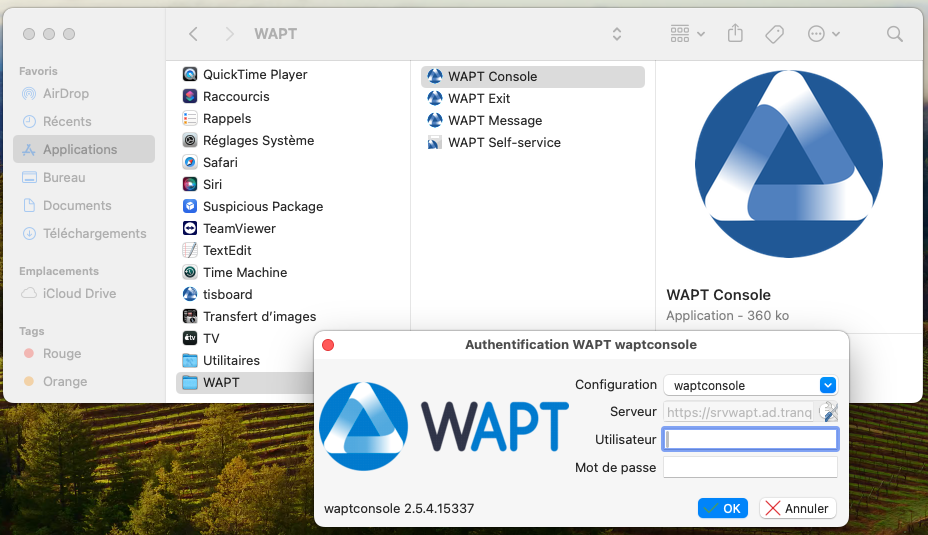
Lancement de la console WAPT sous macOS¶
Attention
Même si vous n’utilisez pas l’agent WAPT pour Windows, il est nécessaire d’installer le paquet tis-waptsetup-windows sur le serveur.
1.1.1. Console de gestion WAPT¶
1.1.1.1. Configuration de la connexion de la console WAPT¶
Si c’est la première fois que vous démarrez la Console WAPT, la fenêtre de configuration s’ouvre automatiquement.

La fenêtre d’authentification de la Console WAPT¶
Saisissez l’adresse du Serveur WAPT, ensuite cliquez sur Vérifiez. Vous devez avoir une erreur.

Erreur TLS dans la configuration de la Console WAPT.¶
Cliquez sur Récupération certificat serveur https. Vous devez avoir une vérification verte pour URL du dépôt principal et URL du Serveur WAPT. Vérifiez également que le certificat SSL du Serveur WAPT est correct avant de continuer.

Le certificat SSL du Serveur WAPT¶

La configuration de la Console WAPT SSL est OK¶
Ensuite si tout est correct, cliquez sur Save. Connectez-vous à la Console WAPT avec le login et le mot de passe SuperAdmin.

La fenêtre d’authentification de la Console WAPT¶
Si vous avez des problèmes pour vous connecter à la Console WAPT, veuillez vous référer à la FAQ : Erreur lors de l’ouverture de la console WAPT.
Il est recommandé de lancer la Console WAPT avec un compte d’administrateur local pour permettre le débogage local des paquets WAPT.
Pour la version Enterprise, il est possible de s’authentifier avec l”Active Directory.
1.2. Activer la licence WAPT¶
Sur WAPT, la différence entre les versions Discovery et Enterprise est gérée par la licence utilisée.
Pour activer la licence, utilisez le fichier licence.lic communiqué par notre département de vente.
Si vous lancez la Console WAPT pour la première fois, un assistant vous demandera si vous disposez d’une licence WAPT Enterprise.
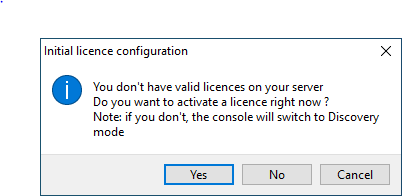
OU Dans la Console WAPT, cliquez sur l’onglet ?.
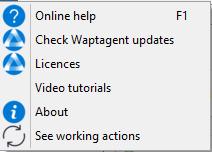
Choisissez Licences.
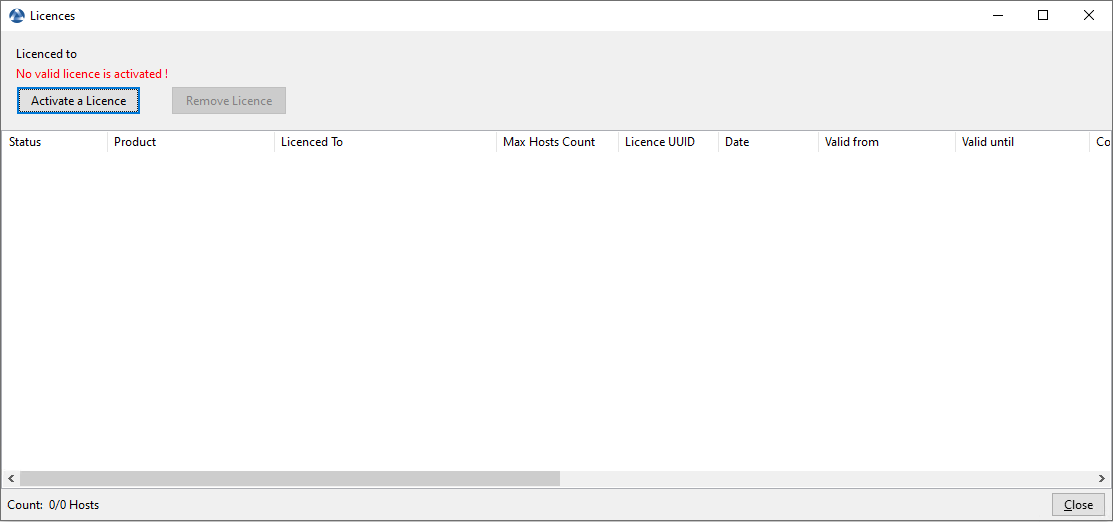
Fenêtre montrant une licence activée dans la Console WAPT¶
Sélectionner le fichier
licence.licet cliquer sur Ouvrir.
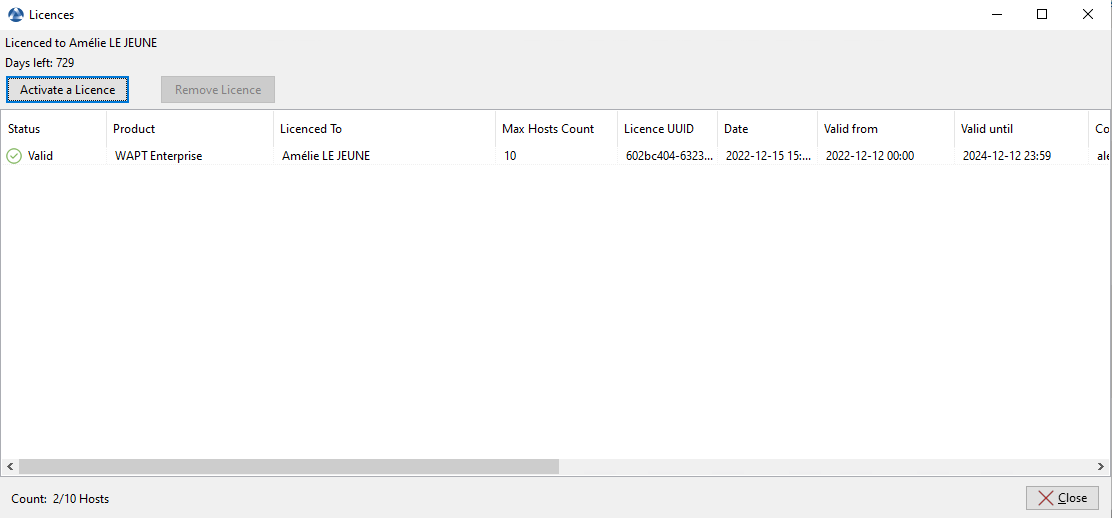
Fenêtre montrant une licence activée dans la Console WAPT¶
Note
Si vous rencontrez des difficultés lors de l’installation de la licence, veuillez vous référer à cette page. Elle répertorie les erreurs courantes et leurs solutions tout au long du document.
1.3. Affectation du certificat¶
Un message peut apparaître indiquant qu’aucun certificat personnel n’est défini dans la Console WAPT.
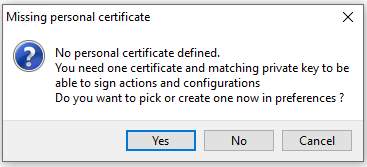
Certificat personnel WAPT non présent dans la Console WAPT¶
Sélectionnez Oui.
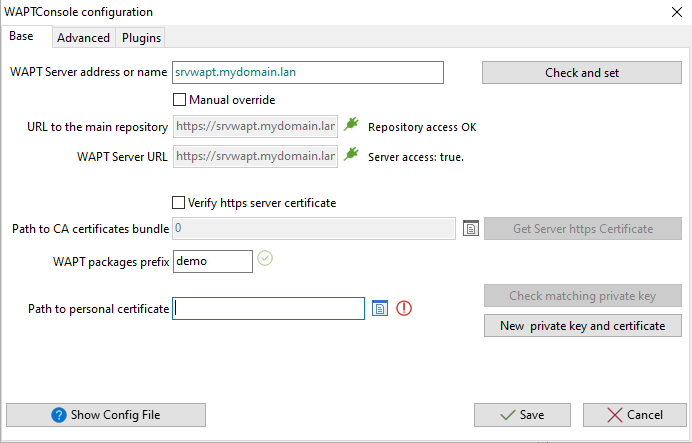
L’onglet basique pour les options de configuration de la Console WAPT¶
Attention
Une erreur fréquente d’utilisation de WAPT est d’être tenté de créer un nouveau certificat à cette étape alors qu’il en existe déjà un.
Si vous avez déjà défini et déployé un certificat sur votre parc d’ordinateurs, vous DEVEZ sélectionner le certificat actuellement défini. Vous NE DEVEZ PAS créer un nouveau certificat.
Si vous utilisez WAPT pour la première fois, cliquez sur Nouvelle clé privée et certificat et voyez comment créer votre certificat.
1.4. Génération du certificat principal pour signer les paquets WAPT¶
Dans cet exemple, le nom de la clé privée est
wapt-private.pem.Dans cet exemple, le nom du certificat public signé avec la clé privée est
wapt-private.crt.
1.4.1. Clef privée wapt-private.pem¶
Danger
Le fichier wapt-private.pem est fondamental pour la sécurité. Il DOIT être stocké dans un endroit sûr et correctement protégé. Le fichier wapt-private.pem NE DOIT PAS être stocké sur le Serveur WAPT.
Le fichier wapt-private.pem est la clé privée, il est situé par défaut dans le dossier C:\private du poste Administrateur et est protégé par un mot de passe.
Cette clé privée sera utilisée avec le certificat pour signer les paquets avant de les télécharger sur le dépôt WAPT.
1.4.2. Certificat public wapt-private.crt¶
Le fichier wapt-private.crt est le certificat public qui est utilisé avec la clé privée. Il est créé par défaut dans le dossier C:\private de l’Administrateur, copié et déployé dans C:\Program Files (x86)\wapt\ssl sur les postes de travail Windows ou dans /opt/wapt/ssl sur les périphériques Linux et macOS.
Ce certificat est utilisé pour valider la signature des paquets WAPT avant leur installation.
Attention
Si le certificat public utilisé sur la Console WAPT n’est pas dérivé de la clé privée utilisée pour générer les Agents WAPT, la Console WAPT ne verra pas l’Agent WAPT et vous ne pourrez pas effectuez d’action avec quel qu’Agent WAPT.
Les certificats enfants des clés privées sont fonctionnels.
1.4.3. Génération d’un certificat à utiliser avec WAPT¶
Dans la console WAPT, aller dans .
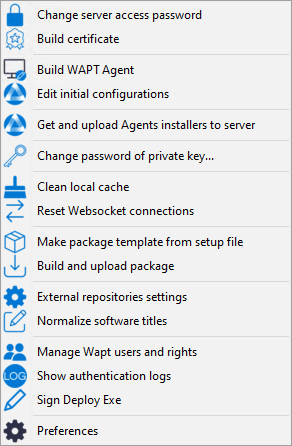
Création d’un certificat auto-signé¶
Avec WAPT Enterprise, vous pouvez créer une clé principale avec une propriété d’Autorité de Certification qui peut à la fois signer les paquets WAPT et signer les nouveaux certificats à utiliser avec WAPT.
Afin de créer de nouveaux certificats signés pour les utilisateurs délégués, veuillez vous référer à créer un nouveau certificat.
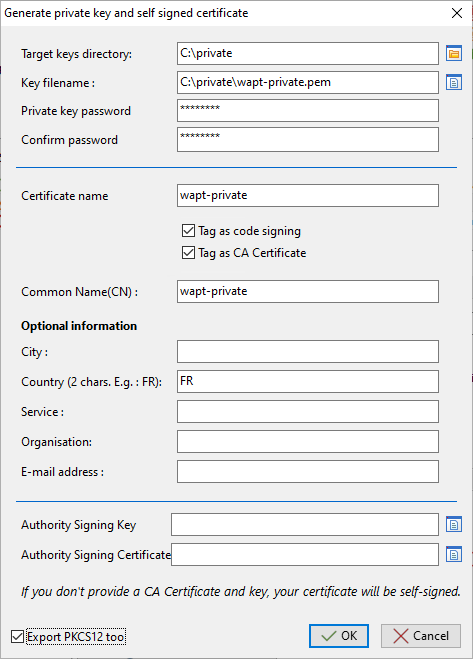
Création d’un certificat auto-signé pour la version WAPT Enterprise¶
Valeur |
Description |
Requis |
Entreprise |
|---|---|---|---|
Répertoire des clés |
Définit le dossier dans lequel la clé privée et le certificat public seront déposés. |
||
Nom du fichier de clés |
Définit le nom de la clé privée .pem. |
||
Mot de passe de la clé privée |
Définit le mot de passe pour déverrouiller la clé privée. |
||
Confirmer le mot de passe |
Confirme le mot de passe pour déverrouiller la clé privée. |
||
Nom du certificat |
Définit le nom du certificat crt. |
||
Marquer comme Code-Signing |
Définit si le certificat/la paire de clés sera autorisé(e) à signer les packages logiciels. |
||
Marque le certificat en tant que CA |
Définit si le certificat peut être utilisé pour signer d’autres certificats (autorité de certification principale ou intermédiaire). |
||
Nom commun (CN) |
Définit le Common Name pour enregistrer le certificat. |
||
Ville |
Définit le nom de la ville du titulaire du certificat à enregistrer dans le certificat. |
||
Pays (2 chars. Ex : FR) |
Définit le nom du pays du titulaire du certificat (FR, EN, ES, DE …) à enregistrer dans le certificat. |
||
Service |
Définit le nom du service ou du département organisationnel du titulaire du certificat à enregistrer dans le certificat. |
||
Organisation |
Définit le nom de l’organisation permettant d’identifier l’origine des paquets WAPT. |
||
Adresse mail |
Définit l’adresse e-mail du titulaire du certificat à enregistrer dans le certificat. |
||
Clé de signature de l’Autorité |
Définit la clé (.pem) de la CA. |
||
Certificat de l’Autorité |
Définit le certificat (.crt) de la CA. |
||
Exporter le fichier PKCS12 |
Force la création du certificat |
Des détails supplémentaires sont stockés dans la clé privée. Ces informations permettront d’identifier l’origine du certificat et l’origine du paquet WAPT.
La complexité du mot de passe DOIT se conformer aux exigences de sécurité de votre Organisation (consultez le site ANSSI pour des recommandations sur les mots de passe).
Danger
Le fichier
wapt-private.pemNE DOIT PAS être stocké sur le Serveur WAPT.
Cliquer sur OK pour passer à l’étape suivante.
Si tout s’est bien passé, le message suivant apparaît.
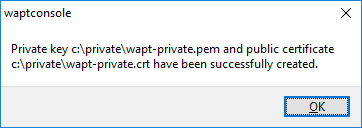
La boite de dialogue informe que le certificat a été généré avec succès¶
Sélectionner OK.
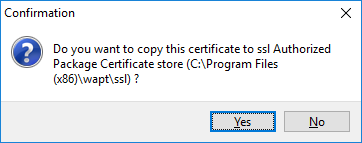
Boîte de dialogue demandant la confirmation de la copie du certificat dans le dossier ssl de la Console WAPT¶
Cliquez sur Oui pour copier le certificat nouvellement généré dans le dossier
C:\Program Files (x86)\wapt\sslsous Windows ou/opt/wapt/sslsous Linux ou macOS. Ce certificat sera récupéré lors de la compilation de l’Agent WAPT et déployé sur les ordinateurs clients.
Vous pouvez passer à l’étape suivante et construire le programme d’installation de l’Agent WAPT.
1.5. Définition du préfixe de paquet¶
Un message peut apparaître indiquant qu’aucun certificat personnel n’a été défini.
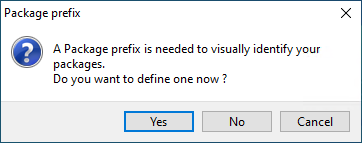
Boîte de dialogue informant qu’aucun préfixe n’a été défini dans la configuration WAPT¶
Sélectionnez Oui
Définissez votre préfixe de paquet sur préfixe des paquets WAPT

L’onglet basique pour les options de configuration de la Console WAPT¶
Avertissement
Le préfixe est sensible à la casse, nous recommandons d’utiliser les minuscules.
1.6. Vérification de l’Agent WAPT¶
Un message peut apparaître indiquant que la version de votre Agent WAPT est obsolète ou n’existe pas encore.
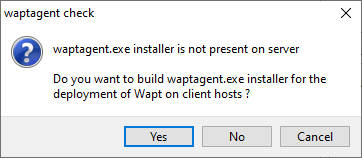
Boîte de dialogue informant que l’Agent WAPT n’est pas présent sur le Serveur WAPT¶
Si le certicat de l’Administrateur existe, il est possible de générer un nouvel Agent WAPT en cliquant sur Oui.
Aussi, cliquez sur Non et générez le certificat Administrateur.
1.6.1. Générer l’Agent WAPT¶
Le binaire waptagent est un installateur InnoSetup.
Une fois que la Console WAPT a été installée sur l’ordinateur Administrator, nous avons tous les fichiers nécessaires pour construire le programme d’installation de l’Agent WAPT.
Avant de construire l’Agent WAPT, vérifiez que vos certificats sont prêts. Si vous souhaitez déployer d’autres certificats publics sur les ordinateurs de votre Organisation équipés de WAPT, vous devrez les copier dans un dossier commun puis sélectionner le dossier lors de la génération de l’Agent WAPT.
L’ancienne méthode de construction de l’Agent WAPT n’empêchait pas la copie de la clé privée d’un Administrator dans C:\Program Files (x86)\wapt. Cela signifie que, par erreur, une clé privée pourrait être déployée sur les ordinateurs du parc, ce qui constituerait une grave faille de sécurité.
Avant 2.3.0, ce dossier était utilisé lors de la construction de l’Agent WAPT et les clés privées seraient ensuite déployées sur tous les ordinateurs.
Maintenant, la nouvelle méthode est beaucoup plus sûre.
La méthode utilise un waptsetup qui est signé par Tranquil IT, nous le copions et nous poussons la configuration dans un fichier json. Alternativement, nous pouvons aussi créer un paquet de configuration WAPT qui sera appelé lors du déploiement de l’Agent WAPT. Cette méthode s’appelle certificate stuffing.
En plus d’éviter les erreurs, comme le déploiement d’un certificat privé par erreur, la méthode présente l’avantage de ne plus nécessiter la création d’un Agent WAPT sur mesure. Cette méthode permet enfin d’éviter qu’un antivirus ne signale à tort le fichier waptsetup comme un faux positif.
Lorsque l’Agent WAPT sera installé silencieusement, il prendra la configuration par défaut : il construira le fichier de configuration wapt-get.ini de l’Agent WAPT et extraira les certificats dans wapt/ssl.
Pour sécuriser cette installation (par exemple avec des GPO), waptsetup.exe et sa configuration intégrée json ont le nom et le hachage du nom de la configuration sur le serveur WAPT. Lorsque le programme d’installation applique la configuration json, il vérifie au préalable avec ce hachage que les données json n’ont pas été modifiées.
Dans la Console WAPT, allez dans .
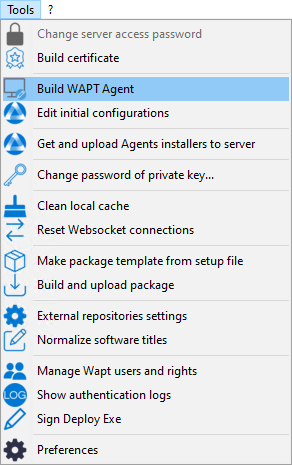
Générer l’Agent WAPT depuis la Console WAPT¶
Avant de construire l’Agent WAPT, vous devez choisir comment il s’identifiera auprès du Serveur WAPT.
1.6.2. Choix du mode d’identification unique des Agents WAPT¶
Dans WAPT, vous pouvez choisir le mode d’identification unique des Agents WAPT.
Lorsqu’un agent WAPT s’enregistre, le Serveur WAPT DOIT savoir s’il s’agit d’une nouvelle machine ou d’une machine qui a déjà été enregistrée.
Pour cela, le Serveur WAPT examine l”UUID de l’inventaire.
WAPT propose 3 modes pour vous aider à distinguer les machines, à vous de choisir le mode qui vous convient le mieux.
Attention
Après avoir choisi un mode de fonctionnement, il est difficile d’en changer, réfléchissez bien !
Ce mode de fonctionnement permet d’identifier les machines de la Console WAPT de manière physique.
Si vous remplacez un ordinateur et donnez au nouvel ordinateur le même nom que le précédent, vous aurez deux ordinateurs qui apparaîtront dans la Console WAPT puisque vous aurez physiquement deux ordinateurs différents.
Note
Certains fournisseurs font un travail inadéquat et attribuent les mêmes UUID de BIOS à des lots entiers d’ordinateurs. Dans ce cas, WAPT ne verra qu’un seul ordinateur ! ! !
Ce mode de fonctionnement est similaire à celui d’Active Directory. Les machines sont identifiées par leur nom d’hôte.
Note
Ce mode ne fonctionne pas si plusieurs machines du parc portent le même nom.
Nous savons tous que cela ne devrait jamais arriver.
Ce mode de fonctionnement permet d’identifier les PC par leur installation WAPT. Chaque installation de WAPT génère un numéro aléatoire unique. Si vous désinstallez l’Agent WAPT puis vous le réinstallez, vous verrez apparaître un nouveau périphérique dans votre Console WAPT.
Note
Dans ce mode, les UUIDs ont le préfixe RMD.
1.6.3. Construire¶
Dans la Console WAPT, allez dans .

Générer l’Agent WAPT depuis la Console WAPT¶
Vérifier les informations qui sont nécessaires pour l’installateur.
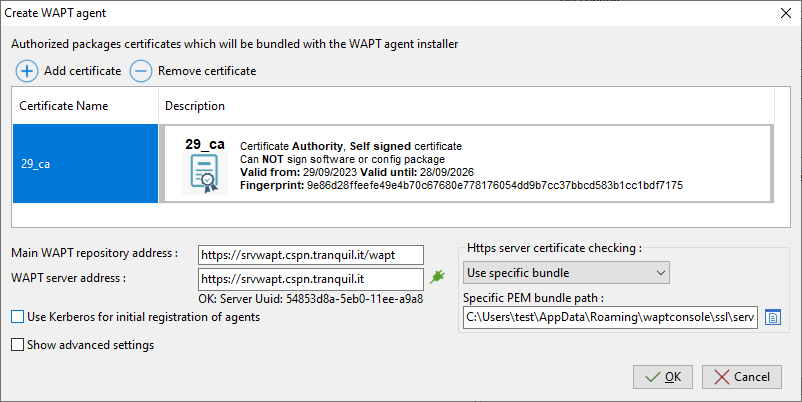
Remplir les informations sur votre organisation¶
Valeur |
Description |
Requis |
Entreprise |
|---|---|---|---|
Certificats de paquets autorisés |
Définit tous les certificats de confiance intégrés au programme d’installation de l’Agent WAPT et définis dans la configuration par défaut. |
||
Adresse du Serveur WAPT |
Définit l’URL du dépôt WAPT principal. |
||
Adresse du serveur WAPT |
Définit l’URL du Serveur WAPT. |
||
Vérifier le certificat https serveur |
Définit si l’authentification client du certificat HTTPS est activée sur le Serveur WAPT. |
||
Utiliser Kerberos pour l’enregistrement initial |
Définit si l’authentification Kerberos des Agents WAPT doit être utilisée avec le Serveur WAPT. |
Danger
La case à cocher Utiliser kerberos pour l’enregistrement initial doit être cochée UNIQUEMENT SI vous avez suivi la documentation pour configurer l’authentification kerberos.
Si vous cliquez sur Voir les options avancées, vous pouvez configurer d’autres paramètres pour l’Agent WAPT.
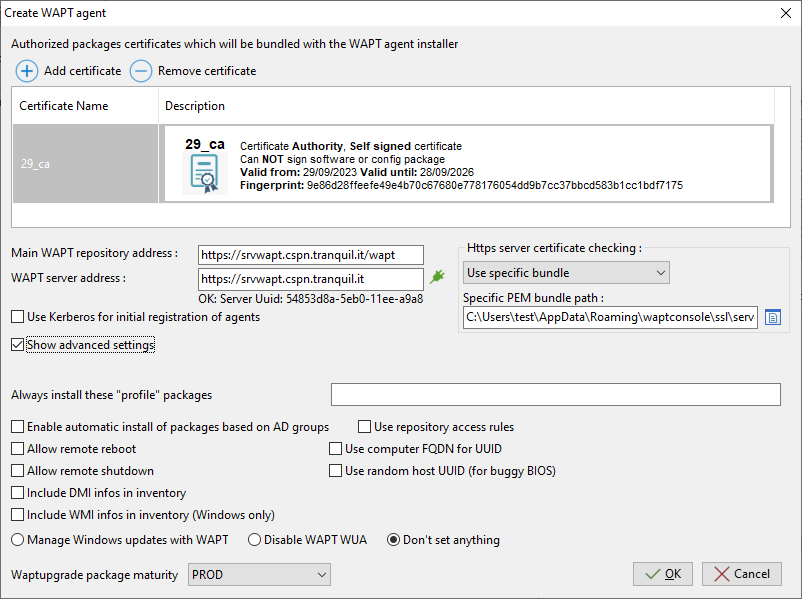
Définir d’autres paramètres pour la configuration de l’Agent WAPT¶
Valeur |
Description |
Requis |
Entreprise |
|---|---|---|---|
Toujours installer ces paquets « profile » sur les postes |
Définit s’il faut installer automatiquement les packages du groupe lors de l’installation de l’Agent WAPT. |
||
Autoriser l’installation automatique de packages basés sur les groupes AD |
Permet l’installation des packages de profil. Cette fonctionnalité peut dégrader les performances de WAPT. |
||
Autoriser le redémarrage à distance |
Définit si les redémarrages à distance sont autorisés à partir de la Console WAPT. |
||
Autoriser l’arrêt à distance |
Définit si les arrêts à distance sont autorisés à partir de la Console WAPT. |
||
Inclure les infos DMI dans l’inventaire |
Obtenir des informations sur les DMI dans l’inventaire de l’agent |
||
Inclure les infos WMI dans l’inventaire |
Obtenir des informations WMI dans l’inventaire de l’agent |
||
Utiliser les règles d’accès au dépôt |
Définit si les règles d’accès aux dépôts doivent être utilisées pour répliquer les dépôts distants. |
||
Utiliser le FQDN de l’ordinateur comme UUID |
Définit si les FQDN doivent être utilisés pour identifier les Agents WAPT. |
||
Utiliser un UUID hôte aléatoire (pour les BIOS bogués) |
Définit si des UUID aléatoires doivent être utilisés pour identifier les Agents WAPT. |
||
Gérer les mises à jour de Windows avec WAPT | Désactiver WAPT WUA | Ne rien définir |
Active ou désactive WAPT WUA. |
||
Maturité du paquet Waptupgrade |
Permet de choisir la maturité du paquet Waptupgrade. |
Pour plus d’informations sur la section Windows update, consultez cet article sur la configuration de WAPTWUA sur l’Agent WAPT.
Fournissez le mot de passe pour déverrouiller la clé privée.
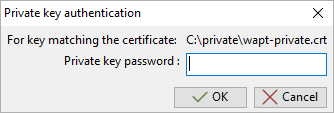
Fournir le mot de passe pour déverrouiller la clé privée¶

Progression de l’installation de l’Agent WAPT¶
Une fois que le programme d’installation de l’Agent WAPT a fini de se construire, une boîte de dialogue apparaît pour vous demande si vous voulez configurer l’Agent WAPT local. Cliquez sur Oui.
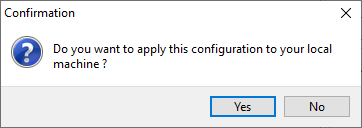
Configuration de l’Agent WAPT local¶
1.7. Configuration initiale  ¶
¶
Il est possible de configurer l’Agent WAPT avec des options standard et avancées via une interface graphique. Très similaire à créer un package de configuration, nous vous recommandons fortement de voir la section au préalable. La configuration initiale vise à configurer des paramètres importants dans l’Agent WAPT, qu’il s’agisse de Windows, Linux ou macOS. La méthode est très utile pour installer un Agent WAPT sur Linux ou macOS.
Dans la Console WAPT, allez dans .
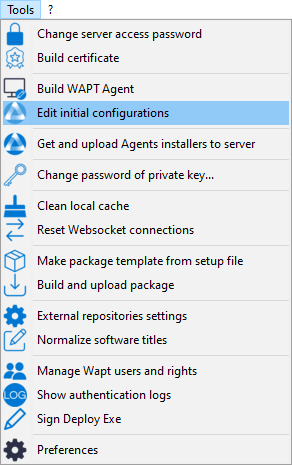
Création de la configuration initiale¶
Après avoir généré l’Agent WAPT Agent pour Windows, une configuration initiale a été créée automatiquement et nommée default.
Remplir les informations nécessaires pour la configuration.
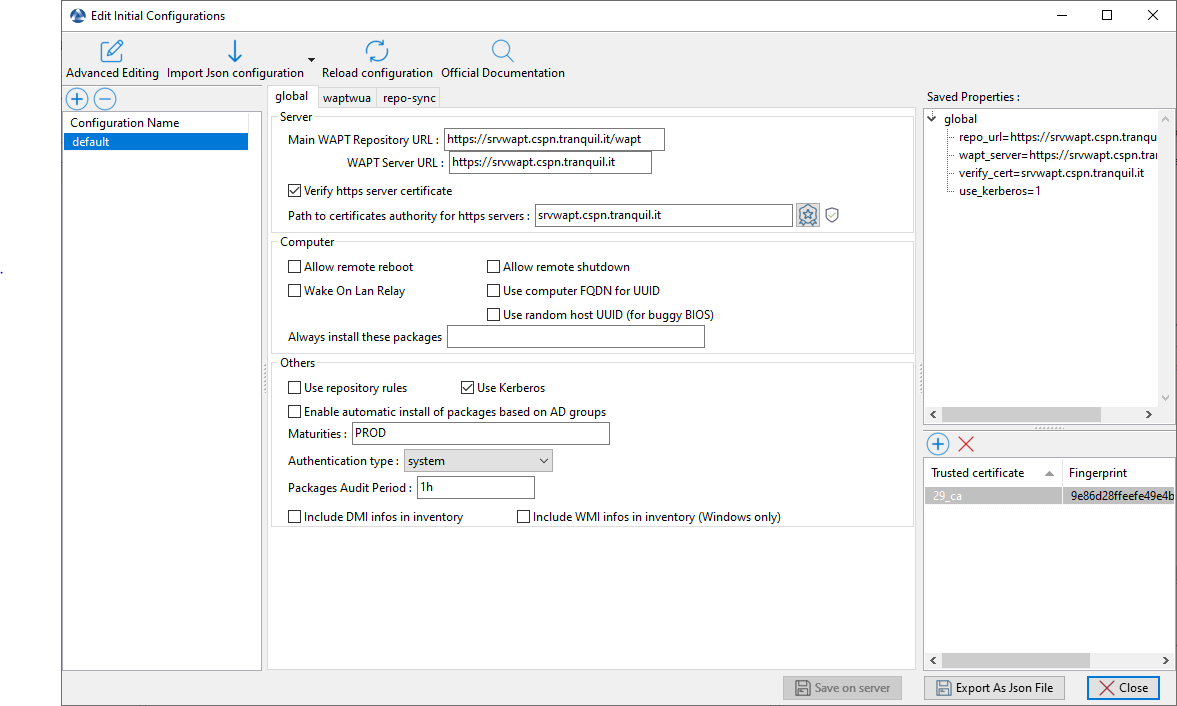
Éditer la configuration initiale¶
Valeur |
Description |
|---|---|
Configuration avancée |
Affiche les options de configuration de l’Agent WAPT comme dans |
Ajouter le certificat |
Ajoute le certificat à la configuration. |
Charger le fichier Json |
Charge une configuration précédemment créée. |
Rafraîchir la configuration du serveur |
Rafraîchit la liste des configurations disponibles. |
+ |
Crée une nouvelle configuration. |
- |
Supprime une configuration. |
Valeur |
Description |
Requis |
Entreprise |
|---|---|---|---|
Adresse du dépôt WAPT principal |
Définit l’URL du dépôt WAPT principal. |
||
URL du Serveur WAPT |
Définit l’URL du Serveur WAPT. |
||
Vérifier le certificat https serveur |
Définit si l’authentification client du certificat HTTPS est activée sur le Serveur WAPT. |
||
Chemin vers l’autorité de certification pour les serveurs https |
Définit le chemin vers les certificats utilisés pour la vérification HTTPS. |
||
Autoriser le redémarrage à distance |
Définit si les redémarrages à distance sont autorisés à partir de la Console WAPT. |
||
Autoriser l’arrêt à distance |
Définit si les arrêts à distance sont autorisés à partir de la Console WAPT. |
||
Relai Wake-on-Lan |
Active la fonctionnalité WoL sur les dépôts secondaires. |
||
Utiliser le FQDN de l’ordinateur comme UUID |
Définit si les FQDN doivent être utilisés pour identifier les Agents WAPT. |
||
Toujours installer ces paquets |
Définit s’il faut installer automatiquement les packages du groupe lors de l’installation de l’Agent WAPT. |
||
Utiliser les règles du dépôt |
Définit si les dépôts sont répliqués. |
||
Utiliser Kerberos |
Définit si l’authentification Kerberos des Agents WAPT doit être utilisée avec le Serveur WAPT. |
||
Autoriser l’installation automatique de packages basés sur les groupes AD |
Permet l’installation des packages de profil. Cette fonctionnalité peut dégrader les performances de WAPT. |
||
Maturités |
Liste des maturités de paquets qui peuvent être visualisées et installées par l’Agent WAPT. La valeur par défaut est |
||
Type d’authentification |
Définit le mode de fonctionnement de l’authentification en libre-service. Les valeurs possibles sont : system, waptserver-ldap ou waptagent-ldap. |
||
Fréquence d’audit des paquets |
Définit la fréquence à laquelle les audits sont déclenchés. |
Valeur |
Description |
Requis |
|---|---|---|
Gérer les mises à jour de Windows avec WAPT |
Active ou désactive WAPT WUA. |
|
Autoriser toutes les mises à jour par défaut, sauf si elles sont explicitement interdites par les règles |
Définit s’il faut autoriser toutes les mises à jour de Windows si elles ne sont pas interdites par des packages de règles WUA. |
|
Criticités autorisées |
Définit une liste de criticités qui sera automatiquement acceptée durant un scan WAPT Windows update. ex. : Important, Critical, Moderate. |
|
Télécharger les mises à jour depuis les Serveurs Microsoft |
Définit si les mises à jour sont téléchargées directement à partir des Serveurs Microsoft. |
|
Planification des Scans / Téléchargements |
Configure la récurrence des scans des Windows Update (ne fera rien s’il y a un paquet de règles waptwua ou que le fichier |
|
Installer les mises à jour Windows en attente à l’arrêt |
Force les mises à jour à s’installer lorsque l’hôte s’éteint. |
|
Programmation des installations |
Configure la récurrence des installations Windows Update (ne fera rien s’il n’y a aucune mise à jour en attente). |
|
Délai minimum avant installation (jours après la date de publication) |
Définit un délai d’installation différée avant la publication. |
Attention
Ces options ne doivent être utilisées qu’avec un dépôt secondaire.
Valeur |
Description |
Requis |
|---|---|---|
Utiliser un dépôt secondaire |
Permet au dépôt secondaire de se synchroniser avec le dépôt principal. |
|
Répertoires à synchroniser |
Définit les dossiers à synchroniser. |
|
Synchroniser uniquement lorsque demandé |
Activer ou désactiver la synchronisation automatique |
|
Fréquence de synchronisation |
Définit la périodicité de la synchronisation. |
|
Heure locale du dépôt pour le début de la synchronisation |
Définit l’heure de début de la synchronisation (HH:MM / format 24h). |
|
Heure locale du dépôt pour la fin de la synchronisation |
Définit l’arrêt du début de la synchronisation (HH:MM / format 24h). |
Valeur |
Description |
|---|---|
Propriétés sauvegardées |
Liste des options avec la configuration. |
Certificat |
Liste des certificats avec la configuration. |
Valeur |
Description |
|---|---|
Sauvegarder sur le serveur |
Sauvegarde la configuration sur le Serveur WAPT. |
Exporter en Json |
Exporte la configuration en JSON. |
Fermer |
Ferme la fenêtre. |
Après la configuration, il est possible de copier les commandes en cliquant avec le bouton droit de la souris sur la configuration.
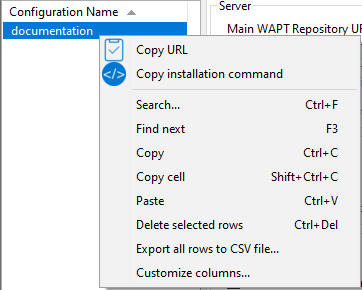
Commande de copie¶
Valeur |
Description |
|---|---|
Copier l’URL |
Donne une URL de téléchargement pour récupérer le .json du Serveur WAPT. |
Copier la commande d’installation |
Donne une commande pour installer la configuration d’un Agent WAPT. |
Note
Il est possible d’installer un Agent WAPT vierge et de lui donner la commande d’installation copiée pour fournir la configuration.